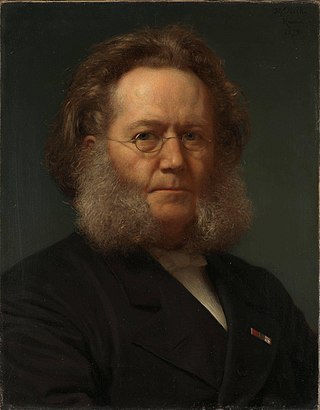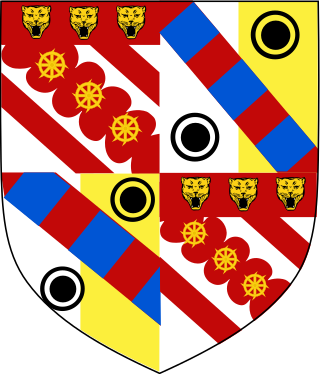Related Research Articles

Henrik Johan Ibsen was a Norwegian playwright and theatre director. As one of the founders of modernism in theatre, Ibsen is often referred to as "the father of realism" and one of the most influential playwrights of his time. His major works include Brand, Peer Gynt, An Enemy of the People, Emperor and Galilean, A Doll's House, Hedda Gabler, Ghosts, The Wild Duck, When We Dead Awaken, Rosmersholm, and The Master Builder. Ibsen is the most frequently performed dramatist in the world after Shakespeare, and A Doll's House was the world's most performed play in 2006.

Scandinavia is a subregion in Northern Europe, with strong historical, cultural, and linguistic ties between its constituent peoples. Scandinavia most commonly refers to Denmark, Norway, and Sweden. In English usage, it can sometimes also refer more narrowly to the Scandinavian Peninsula, or more broadly to all of the Nordic countries, also including Finland, Iceland, and the Faroe Islands.
Norwegian literature is literature composed in Norway or by Norwegian people. The history of Norwegian literature starts with the pagan Eddaic poems and skaldic verse of the 9th and 10th centuries with poets such as Bragi Boddason and Eyvindr Skáldaspillir. The arrival of Christianity around the year 1000 brought Norway into contact with European medieval learning, hagiography and history writing. Merged with native oral tradition and Icelandic influence, this was to flower into an active period of literature production in the late 12th and early 13th centuries. Major works of that period include Historia Norwegie, Thidreks saga and Konungs skuggsjá.

Bjørnstjerne Martinius Bjørnson was a Norwegian writer who received the 1903 Nobel Prize in Literature "as a tribute to his noble, magnificent and versatile poetry, which has always been distinguished by both the freshness of its inspiration and the rare purity of its spirit". The first Norwegian Nobel laureate, he was a prolific polemicist and extremely influential in Norwegian public life and Scandinavian cultural debate. Bjørnson is considered to be one of the four great Norwegian writers, alongside Ibsen, Lie, and Kielland. He is also celebrated for his lyrics to the Norwegian national anthem, "Ja, vi elsker dette landet". The composer Fredrikke Waaler based a composition for voice and piano (Spinnersken) on a text by Bjørnson, as did Anna Teichmüller.

Earl of Cranbrook is a title in the Peerage of the United Kingdom, created in 1892 for Gathorne Gathorne-Hardy, Viscount Cranbrook. The title is named after Cranbrook in the county of Kent. The family seat is Great Glemham House, near Saxmundham, Suffolk.

Sverre Sigurdsson was the king of Norway from 1184 to 1202.
Eystein Meyla was elected a rival King of Norway during the Norwegian Civil War period.
The Vikings at Helgeland is Henrik Ibsen's seventh play. It was written during 1857 and first performed at Christiania Norske Theater in Oslo on 24 November 1858. The plot takes place during the time of Erik Blood-axe in the north of Norway in historic Helgeland, a time in which Norwegian society was adjusting from the tradition of Old Norse Sagas to the new era of Christianity. It concerns the arrival of Ornulf, who with his seven sons is seeking his daughter, Dagny, and foster-daughter, Hjordis, who were abducted and married by Sigurd and Gunnar, respectively. Tragedy compounded by conceptions of honour and duty lead to the deaths of all of Ornulf's sons, Sigurd, and Hjordis. The plot is reminiscent of the Germanic myth of Sigmund and Brynhilde.

Port Regis School is a co-educational preparatory school located in 140 acres of parkland on the Dorset-Wiltshire border in southern England, situated between the towns of Shaftesbury and Gillingham.

Terje Vigen is a poem written by Henrik Ibsen, published in 1862. Much of the story and setting is from the area around the town of Grimstad in southern Norway where Ibsen lived for a few years in his youth. It describes the dramatic saga of Terje who, in 1809, tried to run the British blockade of Norway's southern coast in a small rowboat in a desperate attempt to smuggle food from Denmark back to his starving wife and daughter. He was captured and imprisoned on a British prison hulk and released in 1814 after the Napoleonic Wars were over, only to find that his family had died. He became a pilot, and years later rescued an English lord who turned out to be the commander of the ship that had captured him. The denouement, as in most Ibsen works, should be understood by reading the original.

The Danish language developed during the Middle Ages out of Old East Norse, the common predecessor of Danish and Swedish. It was a late form of common Old Norse. The Danish philologist Johannes Brøndum-Nielsen divided the history of Danish into "Old Danish" from 800 AD to 1525 and "Modern Danish" from 1525 and onwards. He subdivided Old Danish into "Runic Danish" (800–1100), Early Middle Danish (1100–1350) and Late Middle Danish (1350–1525).
Scandinavian literature or Nordic literature is the literature in the languages of the Nordic countries of Northern Europe. The Nordic countries include Denmark, Finland, Iceland, Norway, Sweden, and Scandinavia's associated autonomous territories. The majority of these nations and regions use North Germanic languages. Although the majority of Finns speak a Uralic language, Finnish history and literature are clearly interrelated with those of both Sweden and Norway who have shared control of various areas and who have substantial Sami populations/influences.

The civil war era in Norway began in 1130 and ended in 1240. During this time in Norwegian history, some two dozen rival kings and pretenders waged wars to claim the throne.
Nicholas Arnesson was a Norwegian bishop and nobleman during the Norwegian civil war era. He was a leader in the opposition against King Sverre of Norway and founder of the Bagler party. He is a chief antagonist in Sverris saga. and also appeared in The Pretenders, an historic drama written by Henrik Ibsen in 1863.

Edward Oswald Gabriel Turville-Petre was an English philologist who specialized in Old Norse studies.

Konrad Maurer, since 1876 Konrad von Maurer was a German legal historian. He was the son of legal historian and statesman Georg Ludwig von Maurer (1790–1872). Maurer is considered one of the most significant researchers of Nordic legal and constitutional history.

Snorri Sturluson was an Icelandic historian, poet, and politician. He was elected twice as lawspeaker of the Icelandic parliament, the Althing. He is commonly thought to have authored or compiled portions of the Prose Edda, which is a major source for what is today known as Norse mythology, and Heimskringla, a history of the Norse kings that begins with legendary material in Ynglinga saga and moves through to early medieval Scandinavian history. For stylistic and methodological reasons, Snorri is often taken to be the author of Egil's saga. He was assassinated in 1241 by men claiming to be agents of the King of Norway.
James Walter McFarlane was a scholar of European literature, author of The Oxford Ibsen, and founding Dean of the School of European Studies at University of East Anglia which included Scandinavian studies.
The Hon. Robert Gathorne-Hardy, was a British prose writer, poet, botanist, and horticulturalist. He was educated at Eton College and Christ Church, Oxford. Robert was the third of four sons of Gathorne Gathorne-Hardy, 3rd Earl of Cranbrook. He was for forty years a resident of Stanford Dingley in Berkshire. In Oxford he co-founded the Uffizi Society alongside Anthony Eden and Lord David Cecil.

Gathorne-Hardy is the name of a British aristocratic family. The first part of the name is pronounced with a long a, i.e. "gay-thorn". The founder of the family was Gathorne Gathorne-Hardy, 1st Earl of Cranbrook. The "eccentric Gathorne-Hardys" as they are sometimes known, have produced many notable members of 19th and 20th century British society.
References
- 1 2 Geoffrey Malcolm Gathorne-Hardy
- 1 2 3 Robert Gathorne-Hardy, 'Geoffrey Malcolm Gathorne Hardy', Polar Record 16:102 (1972), p.447
- ↑ England and Wales Civil Registration Marriage Index, Jan 1914, Kensington 1a 170
- ↑ 1881 England Census, Class: RG11; Piece: 807; Folio: 11; Page: 14; GSU roll: 1341190